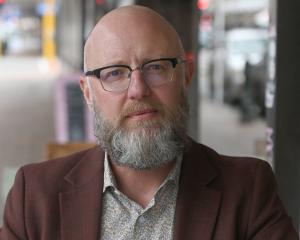

- SUBSCRIBER: Career works in harmony
- SUBSCRIBER: Class Act 2015 - Where are they now?
Artificial intelligence might offer endless possibilities but it’s connections between people where many former recipients of the ODT Class Act award see opportunities.
Each year, the Otago Daily Times catches up with the people who received the high school excellence award a decade earlier, asking them how their lives are going and if they are still pursuing the interests they had in their last year at secondary school.
This year, we also asked them where they could see opportunities.
While a few identified geographic locations, most suggested areas where they saw potential for more jobs or the ability to address important issues.
Despite his job’s focus on technology and AI, Ron Poon believed the biggest business openings were in helping people lead healthier lives and spend less time in front of screens.
This included more ‘‘human experiences’’ that offered people the chance to connect on a deeper, more emotional level, the former Dunedin man who works for a technology start-up in Toronto and is among the 28% of respondents living overseas said.
‘‘Perhaps it’s a card game that’s aimed at fostering deeper conversations, escape rooms, indoor team-bonding activities or yoga/meditation retreats.
‘‘Anything that is aimed at helping people disconnect and spend quality time together.
‘‘Ultimately, I don’t think all the opportunities in the world are in automation, robotics and AI.’’
HR adviser Matt Hesson felt people would yearn for ‘‘analog’’ and ‘‘real’’ experiences as generative AI became more accessible, and the people who would be successful would be those who figured out how to commercialise them.
With technology reshaping how people interact, policy adviser Erika Burdon said ‘‘in-person human connection’’ was becoming less common but more valuable.

Meanwhile, Hannah Ballantyne, an engagement adviser, saw advantages in a move ‘‘back’’ towards connection with neighbours and community-building.
‘‘So much of the world is at our fingertips, while so many people are feeling isolated,’’ she said.
Project manager Hebe Juan believed there were opportunities in how humans harnessed technology - especially AI - to build a better society, while Jacobi Kohu-Morris, who is doing a master’s of laws at Cambridge University, said the growth in tech meant there were opportunities anywhere in the world.
The other area where the group saw big potential was tackling climate change.
When it came to this, civil engineer Emily Molloy felt her generation could ‘‘leverage a lot of change as a collective’’.
Environmental studies, renewable energy and climate-related analysis were all seen as growth areas.
‘‘We’re clearly heading towards ecological difficulties in the not-too-distant future,’’ science graduate Alex Lister commented.
‘‘People may not seem to care now, but once crops become more difficult to grow, water starts to become more scarce and weather events become more severe, people will be throwing a great deal of resources behind trying to fix these problems.’’
Sage Anastasi, who is studying for a PhD in data science, said there was a difference between where the opportunities were and where he would like them to be.
‘‘There are opportunities in things like data science, tech and other knowledge creation fields, for sure.
‘‘However, I worry a lot about sustainability and I’m uncertain about the future of advanced economies which rely on those areas a lot.’’
Covid was a ‘‘big wake-up call’’ regarding the fragility of supply chains and more global shocks were on the horizon, he said.
‘‘I’d love for there to be more opportunities in things like local manufacturing, slow fashion and other areas that would help us decarbonise and increase our resilience against systemic shocks.’’
Several felt there were opportunities everywhere for those who worked hard or were willing to step outside their comfort zone.
Corporate development manager Aleisha Ruske said this was especially true for motivated New Zealanders.
‘‘Driven and passionate people tend to find opportunities wherever they go; on the off chance they can’t find one, they’ll create it for themselves.’’
The Class Act awards recognise excellence in a variety of areas, from academic ability to success in sports and cultural activities, and the range of interests pursued by the 2015 recipients has continued into adulthood.
Now mostly aged 27 and 28, they include business owners, doctors, lawyers, engineers, composers and athletes.
However, only 36% of those who responded to our questions took the path they had planned in high school.
Risk consultant Ruby Parker said she had followed her curiosity and ‘‘rolled with the unexpected’’ - ‘‘the path hasn’t been straight but it’s been interesting’’ - while claims manager Oli Chignell reported the route he had taken was ‘‘very different’’ to the one he had mapped out.
‘‘Plans and life change, but learning to adapt to the changes has been the most important part of it all.’’

Sporting commitments had made this difficult but she was far from dissatisfied because the experiences she had enjoyed and the friendships she had made ‘‘trumped all else’’.
Like many their age, the 2015 recipients are busy building their careers, doing further study, playing sport and volunteering, so we also asked how they manage to maintain full, well-rounded lives.
Junior doctor Lydia Dunford admitted this was an ‘‘endless struggle’’.
However, she was lucky to have a fulfilling job and to be able to run or cycle to work, which provided her with exercise and time outside.
Many felt it was important to carve out time for the things they enjoyed, such as hobbies, travel, staying active and being with friends and family.
Business owner Slade O’Connor saw relationships, career and health/fitness as three sides of a triangle and said he tried to achieve balance through ‘‘strong daily habits and routines’’.
Phoebe Smith, who teaches in London, said it had been important to find purpose and challenge in her career, ‘‘but equally to prioritise a fun and busy life outside of work - travelling regularly and trying new things, while staying connected to home’’.
Having goals across multiple areas of life helped Emily Molloy because if she focused on only one thing, she put too much pressure on herself.
Former rower Karley Wilden-Palms said she used to define success by awards, qualifications, outward image and winning but with time away from competitive sport and gruelling schedules, she rediscovered simple things that made her happy.
These included creative hobbies, time outdoors and ‘‘simply appreciating all life’s moments, not just the awards and medals’’.
When it came to offering advice to this year’s school leavers, the group said they shouldn’t feel pressured to have their lives figured out at 18.
‘‘Don’t stress about the future, or too much about your grades,’’ Ballantyne offered.
‘‘Life’s about doing cool things with cool people.’’
Several encouraged the class of 2025 to let go of other people’s expectations of them and to pursue the things that interested them.
Embracing change, and being open to different perspectives and opportunities, were also considered important.
Consultant Aaron Anderson felt with career changes ‘‘almost inevitable’’, the most valuable skill school-leavers could cultivate was the habit of continuous learning.
He also advised them to be mindful of how they used AI tools, saying they would become more capable if they grappled with challenges themselves.
Osteopath Krystee Barclay did not envy this year’s cohort, saying every generation seemed more precarious than the last in terms of the job market, housing, cost of living and the environment. However, young people had good ideas to address those issues so it was ‘‘not all doom and gloom’’.
On a practical note, some encouraged school leavers to make the most of their KiwiSaver and interest-free student loan, to spend less time on social media, and to treat university like a structured, full-time job rather than make a habit of ‘‘all-nighters’’.
Construction foreman Oscar Goodlet was among many who urged them to enjoy this stage of their lives, when they had few responsibilities.
‘‘You’re only young once. So go and do what makes you happy.’’
This year’s Class Acts
The Class Act awards began in 2000. The pupils are selected by their schools based on excellence in a variety of areas, including academic, sporting and cultural achievement.
This year’s recipients will be profiled in a special ODT publication and online on Tuesday and will receive their awards from Prime Minister Christopher Luxon in Dunedin on Thursday.











